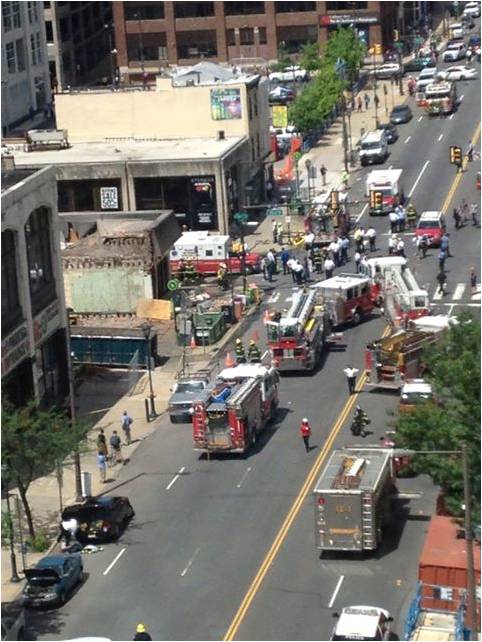 Center City, Philadelphia was faced with a tragic event Wednesday, June 5 when a building came crumbling down onto an adjacent building on 22nd and Market Streets. A total of six lives were lost and 13 people injured as rescue crews excavated bodies and survivors from the rubble.
Center City, Philadelphia was faced with a tragic event Wednesday, June 5 when a building came crumbling down onto an adjacent building on 22nd and Market Streets. A total of six lives were lost and 13 people injured as rescue crews excavated bodies and survivors from the rubble.
A two-story wall of a building being demolished came down around 10:30am EST onto a neighboring Salvation Army thrift store below. The loss of life in this demolition accident is tragic, and now people are asking the questions: why and how did this happen?
CBS 3 reported excavator operator, Sean Benschop who was involved with Wednesday’s building collapse was charged with six counts of involuntary manslaughter, 13 counts of recklessly endangering another person and one count of risking a catastrophe. Benschop, 42-years-old was drug tested two hours after the event.
Blood and Urine drug test results came back positive for prescription painkillers and marijuana. According to a toxicology report, Benschop had levels of marijuana in his system showing “he was unfit to perform safety-sensitive, job-related duties.” The report found it “reasonably scientifically certain” that Benschop was an “active recent user of marijuana”
Further investigation shows that Benschop has a prior record of 11 arrests including a possession and drug dealing conviction. He served two terms in prison on drug charges in the 1990s
Families of the victims and city officials are searching for answers. City Prosecutors were present at the scene Wednesday and now, fallout is mounting in a city where demolition contractors are lightly regulated.
Robert Mongeluzzi, Attorney for Nadine White, a woman pulled from the rubble said the demolition contractor, Griffin Campbell violated multiple federal safety regulations at the demolition site. CBS News obtained this quote from Mongeluzzi:
“From what we can understand, given (Campbell’s) checkered past, and what appears to be a total lack of experience and know-how, we believe that was a grossly negligent selection.”
The contractor selection on the part of building owner, Richard Basciano, Mongeluzzi argues, should have been more selective.
In a recent press conference, Philadelphia Mayor Michael Nutter vowed to reform construction sites including conducting random drug tests on heavy equipment operators, adding
“We can do much better. We will not accept the status quo in the face of this tragedy.”
Still unanswered are the questions, why and how this building collapsed, yet an apparent criminal probe is underway and should shed some light on the fatal construction mishap.
As this story unfolds, the importance of employment background checks has taken center stage.Many questions remain unanswered. Among them:
- How was the demolition contractor, Griffin T. Campbell, selected after declaring bankruptcy in March after two years in business and who had a fraud conviction?
- How was the demolition itself entrusted to a man with a criminal conviction history that posed a significant risk in performing “safety-sensitive job duties”?
- What steps did the contractor take during the hiring and selection process to ensure that workers were qualified and vetted to perform safety sensitive duties?
These questions highlight the dilemma most employers face when attempting to balance the need to be more tolerant of past transgressions of applicants versus the need to reduce business risk.
On the one hand, federal, state and local governments are issuing new guidance and regulations requiring employers to be more lenient regarding their use of criminal records when making employment decisions.
On the other hand, employers can be held accountable for negligent hiring if proven that reasonable steps were not taken to ensure public and workplace safety and security.
Our recommendations:
- Conduct proper due diligence on all businesses, partners and entities before entering new agreements.
- Ensure that all agreements for selecting contractors include requirements for background screening workers assigned to the project. Provide contractor with a list of criteria, including examples of criminal activity that would bar workers from the project.
- Consider implementing a random drug testing program to deter workers from drug and alcohol abuse.
Require additional tips and guidance on how to legally and effectively conduct due diligence or background checks? Contact Leon Singletary, who is the President and CEO of First Contact HR, an award-winning background screening company, offers “Keys to Conducting a Proper Background Check”









